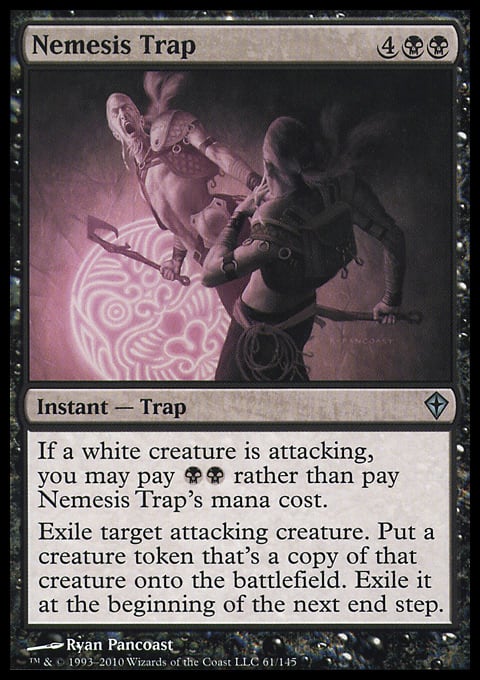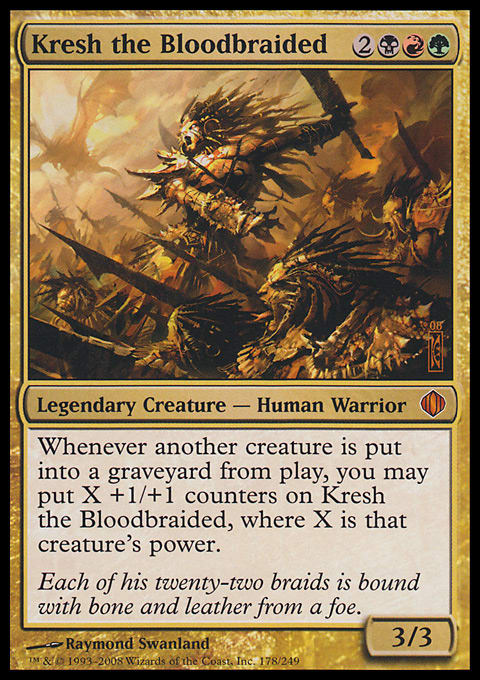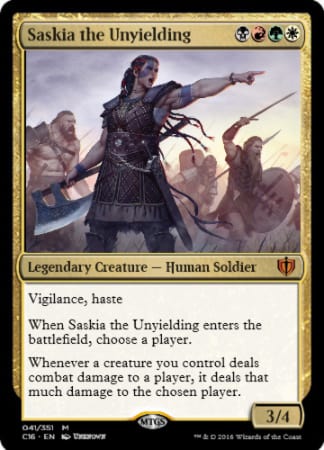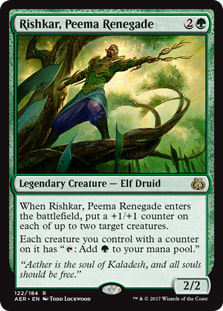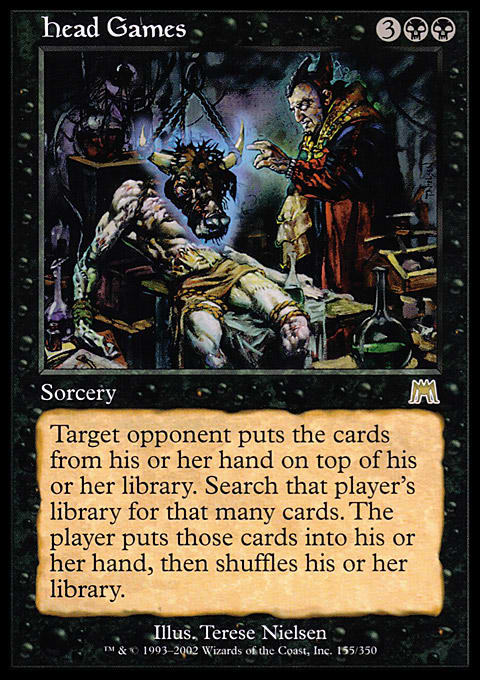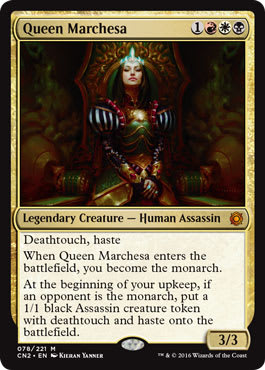Do you know what ‘Nemesis’ means?
“A righteous infliction of retribution, manifested by an appropriate agent. Personified in this case by a horrible c*** . . . me.” 1
With apologies to Guy Ritchie, today I’m going to look at three different types of ‘Nemesis’ relationships in casual playgroups:
- The rival who has your number
- The antagonist who always comes after you
- The archenemy you always have to go after
These are all common patterns of behavior in casual playgroups, and they can tell us a lot about the three layers of multiplayer Magic: the strategic, the political, and the social.
Rival
The first kind of nemesis is someone who you have a hard time beating, not because they are necessarily better than you or their decks are stronger, and not because they focus on you particularly, but because they have a well-developed sense of how your decks work.
My first personal nemesis was Karin. Karin and her husband Jason were mainstays of our playgroup and two of the funnest people I've ever played with, but Karin had a kind of killer instinct that Jason couldn’t match. She would often go through the early and mid-game without singling out anyone in particular, and then out of the blue she would swing round and open fire on me with everything she had. The thing of it was, she usually timed it just right: I could complain that I hadn't done anything to deserve this aggression, and I wasn’t the threat, and woe is me . . . but anyone who saw my hand would know that she took me out me just in time.
The other opponent who always seemed to know when to come at me was Josh, universally agreed to be the funnest guy anyone ever played cards with. He was super-easygoing and his decks were usually mid-tier aggro, but I realized that I actually was not winning a lot of games against him. He confessed that he had developed a spider-sense for when my decks were vulnerable and when they were about to take over, and he used that to take me out at the Opportune Moment.
Both Karin and Josh can teach us several valuable lessons. Most importantly, it is crucial that we understand how the rest of our playgroup sees us. If you have a reputation for exploding from out of nowhere and taking the whole table out, then you have to expect early attention; if you only empty your hand when you’re setting up a big play, you are going to get slapped down as soon as you play your first or second big card. In my case, I have a reputation for only winning long games, so unfortunately a lot of my ‘friends’ come after me early so that I don’t have a life cushion later. They are also more likely to come after some of my favorite value engines, knowing that I never play combo but do occasionally recur Puppeteer Clique a dozen times. Your playgroup will react to — or try to preempt — whatever they see as your ‘usual tricks,’ so you need to either keep things fresh with new cards, decks, and playstyles, or learn to play your old favorites in a sneakier manner.
As an example of the former, I recently dusted off a couple of my most aggro decks: Urabrask the Hidden, Skullbriar, the Walking Grave, and Kresh the Bloodbraided. I haven't played any of them for a while, but because they play so differently from my usual style they were more effective (and maybe more fun). I even found a couple of times when people gave me more leeway because they wanted to see what I would do with a different deck. As an example of the latter, well, I’ll let you know how it goes, but I have realized the need to hold back on playing some of my signature cards until the midgame, when the removal is thinner and my protection/sacrifice options are greater. It really hurts to see a Puppeteer Clique get Path-ed when I’ve only used it to bring back a couple of cards.
Antagonist
The second kind of nemesis is the person who always identifies you as their primary threat. I've had a couple of opponents single me out in games before. My first antagonist was Ryan, who always came out of the gate faster than me, and usually pointed all of his critters at me. In his case, it was mainly a matter of threat assessment, as I later realized he saw me as the nastiest deck-builder at the table. 2 However, there was another guy in that playgroup later who came after me a lot, and I’m pretty sure he just didn’t like me. I guess if you hate someone at the table, the smart play is to make them leave the table by dealing 20/21/40 to their face as fast as you can. In Seoul, I have a good friend who seems to regard me as his default target, and usually seems to assess my threats more seriously than others’. I've even seen playgroups where the same kind of dynamic is totally explicit. How about a husband and wife who always go after each other first, or a playgroup where the default decision-making rubric is, “Attack Dan!”
Whatever is causing this dynamic, you need to be aware of it and respond accordingly. If you’re consistently a target, then you can either go faster or slower, or flip the script entirely. Going faster is probably pretty obvious: bring out early defenses and removal to deal with your nemesis’ attention, or find a way to get your Death Star fully armed and operational before theirs is. Going slower is less intuitive, but sometimes more effective, especially if you don’t have the time or inclination to change your deck before facing your antagonist. If you don’t play any permanents then they can't use their removal on your stuff, and they will eventually have to deal with scary stuff from other players. If they overwhelm your defenses and beat you down, then eventually you stop looking like a problem and they go after someone who is a more imminent threat. Going faster isn't a long-term solution if your antagonist is coming after you because of legitimate threat assessment; going slower doesn’t work against Batters or poison decks, and it doesn’t work well against commander damage, but against more casual assaults it can be a valid strategy).
Flipping the script can mean a lot of different things. If you think someone is acting like your antagonist because of some personal grudge, then actually talking to them about it can be the most effective way of solving the problem. You might also be able to play with other people more until they cool down, forget what they were mad about, or even start to miss you. These are solutions at the social level, but multiplayer Magic is a social game, so sometimes that’s where you have to go.
At the strategic level, you can once again try building different kinds of decks. Maybe they don’t like your play style, so try adopting theirs (“Hey Rhys! I know you don’t like my customary graveyard shenanigans, but check out my new Rishkar, Peema Renegade deck; we’re Elf Brothers!!”). Maybe your deck has weaknesses that they like to take advantage of, or strengths they feel abused by, and another deck would remove the source of contention. Either way, a new deck can work wonders, and it has the added benefit of making you better at Magic.
At the political level, if one player is getting ‘unfairly’ targeted by one other player, then other players can get involved to even things out. Feel free to appeal to either the better nature of your other opponents (“How can I enjoy the game if this clown keeps coming after me?”) or their self-interest (“If you help get my rival off my back, I won’t do anything against you until we’re the last ones standing”). And of course if the rest of the table thinks that your antagonist is being unreasonable, that can ultimately be the best way to get them to change their way of looking at the game.
Archenemy
Ask anyone who has played Magic in Tokyo for a long time who the biggest jerk in town is/was, and I guarantee I know the answer. This guy was such a colossal tool that European and American pro players who only came to town for GPs and PTs had either heard horror stories about him or had their time in Tokyo personally tarnished by this epic douchebag. When I sat down to play with this guy, my goal was usually to get rid of him ASAP so that I could get on with enjoying the game.
While he is the most toxic personality I've ever encountered in the world of Magic, he isn't the only player I know who has triggered this behavior in me and others. Even in my tiny hometown, where I was on a first-name basis with every person who'd ever opened a booster pack, there was one narcissistic flower-child that could ruin a game night for everyone else in the room, and long-time players in Seoul still lament the coming of the pale stranger known only as “Greasy John.” Each of these players has caused me and others to oust them from every game as quickly as possible, partly because of the decks they played, but mainly because of the way they treated the rest of the table.
This is fairly rare though. The far more common archenemy is The Meta-Threat, the one player who always has the toughest, deadliest, broken-est decks. When I first came to Seoul, that person was me, but I haven't held that position since Return to Ravnica at least. Some playgroups don’t have a Meta-Threat for a number of reasons, but if you recognize someone like this in your metagame, then you need to devote yourself to becoming their nemesis if you want to survive.
If someone is the archenemy of the whole group, then you can try to solve the problem socially, politically or strategically, and it doesn’t even matter whether the problem stems from their personality or their decks. Once again, if you have a problem with someone you should try talking to them. You might be surprised how often the people who rub others the wrong way are oblivious to the effect they have; in fact, it seems to me that these folks don’t have a lot of empathy, and that’s why they do what they do. If they had the people skills to understand they were causing problems, they wouldn’t be causing problems in the first place. That means they need someone to tell them (nicely) what the problem is, why it is happening, and what can be done to solve it.
The political option isn't so nice, and so it shouldn’t be your first resort, but if the group is in agreement that one player is a problem, then you can unite against that player, either implicitly or explicitly. That’s why I used the heading ‘archenemy’ here. But be warned: there might not be any coming back from this one. Feelings will be hurt, tempers will be raised, and feuds will be a-feuded. If your playgroup meets in an open public forum then there is the danger that this approach will cause a split that harms the whole group.
That brings us back to a strategic solution to the problem. Beginning with deck construction, then deck selection on game night, you need to be prepared to up your game if you’re going to play against your archenemy. In-game, you need to be patient and smart: don’t waste your removal on somebody else’s threats, and pay particular attention to whatever cunning plans the archenemy is laying, so that you can get the maximum impact from your answers. Don’t start anything with anyone else at the table unless it’s absolutely necessary, and keep your focus on the threat . . .
But . . .
Remember what I said about adversaries? The worst-case scenario is where you realize that there is an archenemy at the table, but the rest of your playgroup either doesn’t recognize the threat or doesn’t know what to do about it. In that case, your strategic calculations can have the unintended effect of creating an unwanted antagonist dynamic. If the person with the strongest decks thinks you are picking on them, and they decide to single you out preemptively, then you’re in for a world of hurt.
If the problem is their decks, not their personalities, then take a lesson from our beloved Queen Marchesa: the iron fist in the velvet glove. Make sure you engage personally and socially with the archenemy, rather than trying to freeze them out. Trade them the cards they need for decks that will screw you over (because they will get them online if they don’t get them from you), and even be prepared to take a bath on those trades. Complement them on the terrifyingly powerful cards and combos in their decks. Above all, you must make it clear that you are going after them because they are the threat, because their decks are stronger, because they are the smartest and best-looking person at the table. Don’t let them think for a second that there is any personal animosity, or else you're likely to get the short end of the stick.
Conclusion
Most of us have run into at least one of these nemesis dynamics, and some will be familiar with all of them. The most intractable is probably what I called the archenemy, the player who reliably brings (relatively) over-powered decks to the table, but the most promising is the first case, the rival. Learn how your opponents play and then you can screw them over just like Karin and Josh screwed me over. Learn how your opponents see you and be aware that while you might see someone as an antagonist, they probably see you as the archenemy.
1 Alan Ford as Brick Top, in Snatch (2000).
2 There was also an element of his play style: Ryan is what I call a Batter, as I wrote about in The Bitter, The Batter and the Butter.













